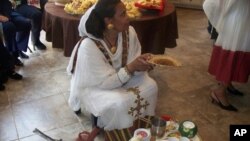The dozens of guests gathered in Marian Kumar’s generously-sized kitchen strain to see the woman in traditional dress sitting on a low stool. A tray with handleless ceramic coffee cups and a portable, single-burner charcoal stove are in front of her. The simple set-up is at odds with the elegant surroundings – gleaming granite countertops and high-end appliances.
Anyalem Barayes is conducting a traditional Eritrean coffee service. She begins by burning incense to ward off evil spirits. Then she roasts coffee beans in a small pan on the charcoal stove.
When that is done, Barayes pushes to her feet and walks around the room with the beans so her audience can inhale their rich scent. Afterwards, she grinds them and proceeds to make the coffee everyone is waiting to taste.
Barayes’ niece, Abeba Telahun, stands nearby, explaining each step to the rapt audience.
“It’s always a pride when you share your culture,” Telahun says afterwards. “It’s always nice when you are sharing your culture and people are aware of it. It’s a great pleasure to share it with the group.”
The group sharing this experience is called THIS for Diplomats - once known as The Hospitality and Information Service. The nonprofit volunteer organization helps families of foreign diplomats adapt to life in the United States.
Today’s gathering includes women from across the globe, including Iraq, Pakistan and Kurdistan. Their convivial chatter fills the air as they sample the wide variety of food laid out in the dining room. Watching them, it’s difficult to believe their presence in this Oakton, Virginia home outside of Washington, D.C., can be traced back to a single tragic event which occurred a half century ago.
Sense of isolation
A little more than 50 years ago, a young African woman with two small children jumped to her death from her high-rise New York apartment. The wife of a UN diplomat who was unfamiliar with modern urban life, she’d become increasingly isolated while her husband worked long hours.
The tragedy prompted the UN to reach out to new diplomats and their families by establishing The New York City Commission for the United Nations and the Consular Corps. Then-U.S. Secretary of State Dean Rusk asked that a similar effort be made to help foreign diplomats in the nation’s capital. The result was The Hospitality and Information Service for Diplomatic Residents and Their Families (THIS).
As the group celebrates its 50th anniversary, THIS’ current president Joan Keston says many of the needs of diplomatic families remain the same.
“They’re very lonely,” explains Keston. “What we give them is one-on-one human contact, someone they can talk to, someone they can relate to. It gives them a sense of community. We have meetings in people’s homes so they can see an American home.”
That casual sense of hospitality makes an impression on Azy Abdullah, a young mother from Brunei who brought her four-year-old son to the coffee gathering. It surprises her that Americans invite guests into their kitchens – something that never happens in Brunei.
“Americans are really open and open-minded as well,” she says. Abdullah, a professional working woman in her own country, is a stay-at-home mother while living in the United States.
THIS outreach
THIS offers a variety of services to women like Abdullah, including coffees such as this one and conversation groups which allow the visitors to practice their English. THIS volunteers also provide rides for women who don’t have any other way of getting to the events.
Additionally, diplomatic families receive help for everyday needs, like where to find a doctor or what cuts of meat are available at American grocery stores. Excursions to historic U.S. sites or other places of interest are also organized.
Nagaza Shadevr of Uzbekistan has been in the U.S. for one year and looks forward to THIS gatherings.
“I want to learn the language and speak in English. The coffees are helping me to speak in English,” says Shadevr in halting English. “They are learning our culture and we are learning their culture and it is so interesting.”
Citizen diplomacy
That shared understanding is a significant part of THIS' mission, which strives to promote international goodwill.
“People relate to each other on a one-to-one basis and it destroys any myth of the ugly American,” says THIS president Keston. “Americans are very warm-hearted and caring and the diplomats see that.”
Tasawar Rangha, whose husband is a trade minister at the Pakistani embassy in Washington, also appreciates the opportunity to shatter negative stereotypes about her country.
“It’s a good thing to do it because we get to integrate with these people. They know more about us and we know more about them,” says Rangha. “I think they have a better picture of us."
Carolyn Peacher, chairperson of the THIS Arlington International Coffee group, says the interactions lead to significant personal revelations. “I think we understand that we are not as far apart as our governments. Primarily we’re there to find out what we have in common, not how we’re different.”
By practicing this citizen diplomacy, THIS members strive to embody the group’s guiding principle - that average Americans, in their natural state, are the best ambassadors a country can have.
